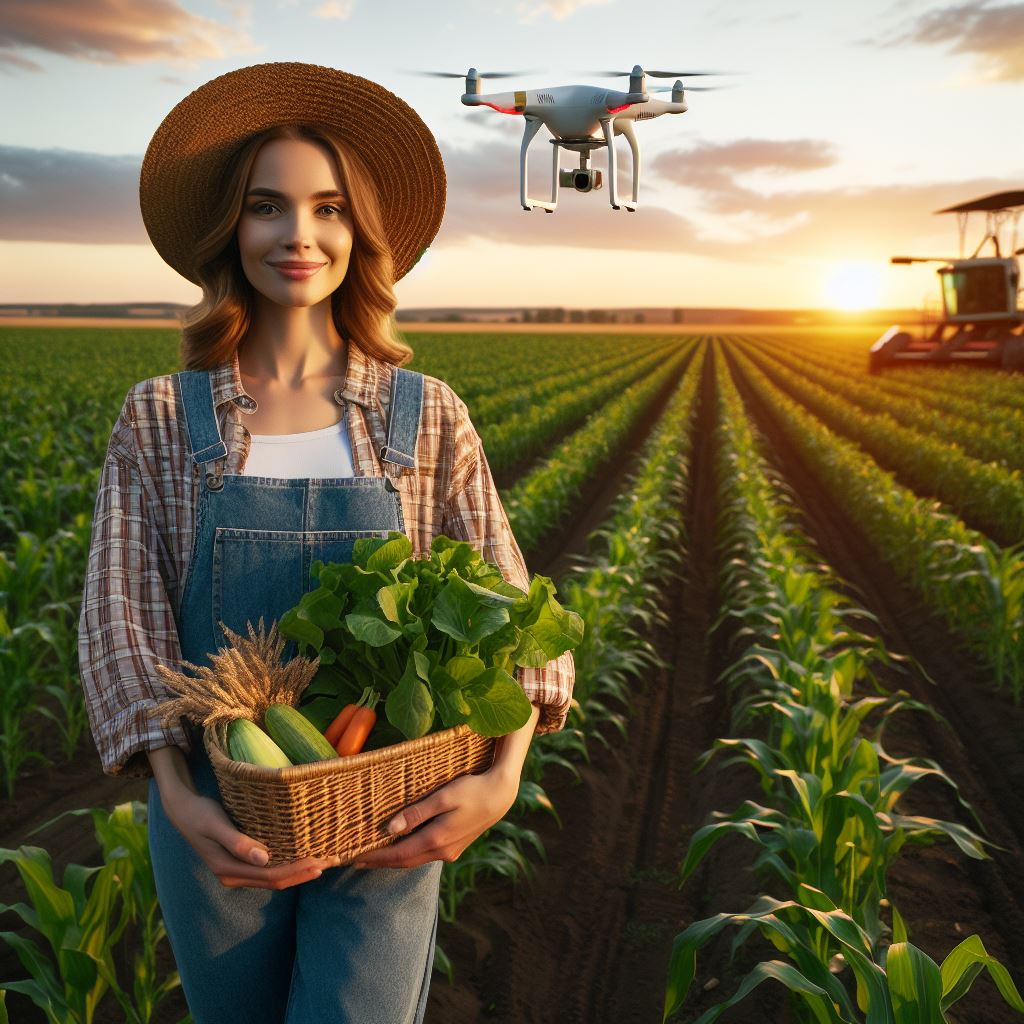Introduction
The youth approach to Innovative farming plays a crucial role in modern agriculture, revolutionizing the way we produce food.
This blog post delves into the youth’s approach to innovative farming and its significance in shaping the future of agriculture.
The youth’s interest and involvement in innovative farming have been steadily growing due to various factors.
With the challenges faced by the agricultural sector, such as climate change, limited resources, and a growing global population, innovative farming methods are vital for sustainable food production.
The youth’s approach to innovative farming
Young farmers are embracing technology and implementing innovative techniques to maximize yields and minimize environmental impact.
They are utilizing advanced machinery, precision farming methods, and smart farming technologies to optimize crop growth and pest control.
Moreover, the youth’s approach to innovative farming extends beyond conventional methods.
They are exploring alternative farming practices, such as vertical farming, aquaponics, and hydroponics, which enable year-round production and efficient resource utilization.
The youth’s adaptability and willingness to experiment with new ideas have propelled them to the forefront of agricultural innovation.
They are actively seeking and implementing sustainable solutions to address key challenges, such as water scarcity, soil degradation, and biodiversity loss.
Additionally, the youth’s approach to innovative farming is transforming the perception of agriculture as a profession.
They are embracing entrepreneurship, diversifying their farm operations, and engaging in direct marketing and farm-to-table initiatives.
Furthermore, the youth’s involvement in innovative farming is crucial for the intergenerational transfer of knowledge.
They are tapping into their tech-savvy mindset to bridge the gap between traditional farming practices and cutting-edge technologies, ensuring the sustainability and profitability of the agricultural sector.
In essence, innovative farming in modern agriculture is of paramount importance.
Transform Your Agribusiness
Unlock your farm's potential with expert advice tailored to your needs. Get actionable steps that drive real results.
Get StartedThe youth’s approach to this field is revolutionizing farming practices and redefining the future of agriculture.
Their active involvement, adaptability, and passion for sustainability are driving the industry forward and ensuring food security for generations to come.
The Interest of the Youth in Agriculture
The increasing interest of young individuals in farming
Agriculture, once perceived as a traditional and laborious profession, is now attracting a new wave of young and enthusiastic individuals.
These young farmers are driven by various reasons, with sustainability and food security concerns at the forefront.
According to recent statistics, there has been a significant increase in the number of young people taking up farming as a profession.
One of the main reasons behind this trend is the growing concern for environmental sustainability.
Today’s youth recognizes the importance of adopting innovative farming practices that minimize the impact on the environment.
They are keen on implementing techniques such as organic farming, crop rotation, and integrated pest management to ensure long-term sustainability.
The reasons behind their enthusiasm
Alongside sustainability, food security is another crucial aspect driving young individuals towards agriculture.
In a world facing an ever-growing population, ensuring a secure and sufficient food supply is paramount.
Young farmers understand that they have a vital role to play in feeding the global population and are eager to contribute.
Moreover, with the increasing availability of technology and information, young farmers have access to a wealth of knowledge and resources.
They can tap into online platforms, attend agricultural conferences, and network with experienced professionals, enhancing their skills and understanding.
Interestingly, urban farming has also gained popularity among the youth, further indicating their enthusiasm for agriculture.
Through rooftop gardens and indoor vertical farming, young individuals are transforming unused spaces into productive agricultural hubs.
These innovative farming methods allow them to grow fresh produce in urban areas, addressing the concern of limited agricultural land.
Statistics or anecdotes that support this trend
There are numerous success stories of young farmers who have achieved remarkable results through their innovative approaches.
For instance, Sarah, a 26-year-old agricultural entrepreneur, started a hydroponic farm in her backyard.
Using nutrient-rich water instead of soil, she managed to yield high-quality vegetables throughout the year.
Her success story inspired many other young farmers to venture into hydroponics, demonstrating the influence of anecdotes.
It is evident that the interest of the youth in agriculture is on the rise, driven by concerns for sustainability and food security.
The statistics and anecdotes support this trend, showcasing the enthusiasm and dedication of young individuals towards innovative farming.
As the youth continues to embrace agriculture, they hold the potential to revolutionize the industry through their fresh perspectives and creative ideas.
With their passion and dedication, the future of farming looks promising, ensuring a sustainable and secure food supply for generations to come.
Showcase Your Farming Business
Publish your professional farming services profile on our blog for a one-time fee of $200 and reach a dedicated audience of farmers and agribusiness owners.
Publish Your ProfileRead: Beating Drought: A Texas Farmer’s Tale
Challenges faced by young farmers
Entering the farming industry as a young farmer can be a daunting task.
The obstacles they encounter can discourage them from pursuing innovative farming methods.
This section will outline some of the challenges young farmers face, including financial constraints, lack of experience, and limited access to resources.
Financial constraints
- Youth are often burdened by limited financial resources when starting their farming ventures.
- Securing loans or funding can be challenging due to lack of credit history or collateral.
- Purchasing land, equipment, and seeds can be financially overwhelming for young farmers.
- The high cost of inputs and fluctuating market prices pose additional financial challenges.
Lack of experience
- Young farmers often lack practical experience and knowledge in agriculture.
- They may not have the necessary skills to manage the complexities of modern farming.
- Inexperience can lead to operational inefficiencies and low crop yields.
- Young farmers may struggle with decision-making in areas such as crop rotation and pest management.
Limited access to resources
- Access to land is a major challenge for young farmers due to high prices and limited availability.
- Infrastructure, such as irrigation systems or storage facilities, may be inadequate or non-existent.
- Limited access to modern technology hinders their ability to adopt innovative farming practices.
- Insufficient access to training programs or mentorship opportunities restricts their learning and growth.
These challenges can discourage young farmers from exploring innovative farming methods.
Examples of discouragement
Financial constraints can force young farmers to rely on traditional farming practices rather than investing in new technologies or sustainable farming methods.
The lack of experience may lead to frustration and suboptimal results, making them hesitant to experiment with innovative approaches.
Limited access to resources hampers their ability to adopt efficient practices that could enhance productivity and profitability.
Furthermore, these challenges can cause young farmers to doubt their ability to succeed in the industry.
The fear of failure may discourage them from taking risks or implementing innovative ideas.
The absence of a supportive network often exacerbates these concerns, leaving young farmers feeling isolated and overwhelmed.
However, it is crucial to address these challenges and support young farmers in their pursuit of innovative farming.
Governments and agricultural institutions can provide financial assistance programs, grants, and subsidies to alleviate financial burdens.
Training programs and mentorship opportunities can enhance their knowledge and skills.
Improving access to land and resources, as well as fostering collaboration within the farming community, can also empower young farmers to overcome these obstacles.
By addressing the challenges faced by young farmers, we can foster a new generation of innovative farmers who will contribute to sustainable agriculture and ensure food security for the future.
Read: Tech Meets Soil: A Young Farmer’s Tale
Initiatives supporting innovative farming by the youth
The youth today are taking an active approach towards farming and bringing innovation to the agricultural landscape.
Numerous organizations, programs, and government initiatives are supporting young farmers in adopting innovative farming techniques.
These initiatives not only provide young farmers with valuable resources and mentorship but also help them access funding options to kickstart their farming ventures.
Organizations, programs, or government initiatives that support young farmers in adopting innovative farming techniques
Organizations such as Greenhorns, National Young Farmers Coalition, and Young Farmers Network are at the forefront of supporting the youth in innovative farming.
They offer resources, networking opportunities, and educational events specifically tailored to young farmers. These organizations create a supportive community where young farmers can learn from each other’s experiences and get guidance from more experienced farmers.
Government initiatives have also recognized the importance of supporting young farmers in their innovative endeavors.
The USDA’s New and Beginning Farmers Program provides grants, loans, and educational opportunities to aspiring young farmers.
These programs help overcome the financial barriers that young farmers often face when starting their farms.
Examples of incubator farms, mentorship programs, and funding options available to young farmers
Incubator farms are another valuable resource for young farmers.
These farms, such as the Agriculture Incubator Foundation in Iowa, provide young farmers with access to land, training, and mentorship.
Incubator farms give young farmers the opportunity to learn the trade in a supportive environment while minimizing the risks and challenges typically associated with starting a farm.
Mentorship programs play a crucial role in guiding and supporting young farmers.
Programs like FarmLink connect experienced farmers with young farmers who can benefit from their knowledge and guidance.
These mentorship programs help young farmers navigate the complexities of farming, learn from the experiences of others, and make informed decisions to adopt innovative farming techniques.
Access to capital is a significant challenge for many young farmers, but funding options specifically targeting them are becoming more available.
The Young Farmer Loan Program, for example, offers financial support to young farmers.
Additionally, crowdfunding platforms like Barnraiser enable young farmers to raise funds for their innovative farming projects and equipment.
These funding options empower young farmers to realize their innovative farming ideas without the traditional barriers to entry.
Business plan competitions have also emerged as a means of supporting young farmers.
Competitions like the Farm Bureau’s Rural Entrepreneurship Challenge provide funding and mentorship to young farmers with innovative business ideas.
These competitions not only offer financial support but also help young farmers refine their business plans and gain valuable insights from industry professionals.
Innovation hubs and agricultural technology centers are another important resource for young farmers.
These centers provide access to cutting-edge farming techniques, technologies, and research.
Showcase Your Farming Business
Publish your professional farming services profile on our blog for a one-time fee of $200 and reach a dedicated audience of farmers and agribusiness owners.
Publish Your ProfileYoung farmers can stay updated with the latest advancements in agriculture, experiment with innovative techniques, and incorporate technology into their farming practices.
Agricultural education programs at universities and colleges play a vital role in equipping young farmers with the knowledge and skills needed for innovative farming.
These programs offer specialized courses in sustainable and organic farming practices, agribusiness, and agricultural technology.
By providing a solid foundation of knowledge, educational institutions prepare young farmers to embrace innovation and contribute to the advancement of the agricultural sector.
Community-supported agriculture (CSA) programs are also contributing to the growth of innovative farming.
These programs connect young farmers directly with consumers, creating a supportive network that allows farmers to experiment and be creative.
CSA programs provide a direct market for young farmers’ produce and encourage them to try new farming techniques and crops.
In general, initiatives supporting innovative farming by the youth are diverse and multifaceted.
From organizations and government programs to mentorship, funding options, and educational resources, young farmers are receiving the support they need to embrace innovation in agriculture.
With these initiatives in place, the future of farming looks promising, as the youth lead the way towards a more sustainable and innovative agricultural sector.
Read: Farm Wisdom: Insights from Veteran Female Farmers
Success stories of young innovators
Innovative farming is not just limited to experienced farmers; it is also being embraced by the youth.
The younger generation is bringing fresh ideas, embracing technology, and implementing sustainable farming practices to overcome challenges and achieve success in the agricultural industry.
Showcasing success stories
One inspiring success story is that of David, a young farmer who transformed his family’s struggling farm into a thriving business.
He implemented a new irrigation system, allowing him to maximize water usage and increase crop yield.
His innovative approach not only saved his farm but also became a model for neighboring farmers.
Another success story is Amelia, who introduced vertical farming in her community.
She established a high-tech vertical farm in an urban setting, utilizing space-saving techniques and hydroponics.
Amelia’s initiative not only provided fresh produce for the community but also created employment opportunities for the local youth.
Implementing new ideas and technologies
Young farmers are not afraid to experiment with new ideas and technologies.
Many have adopted precision farming techniques, using drones for crop monitoring and analysis.
By accurately mapping soil conditions and optimizing fertilizer and pesticide usage, they have increased productivity while minimizing environmental impact.
Sustainable farming practices are another area of focus for innovative youth farmers.
Andrew, for instance, implemented organic farming methods on his small-scale farm.
By avoiding synthetic chemicals and focusing on natural pest control, he not only produced healthier crops but also contributed to preserving biodiversity in his area.
Impact of their initiatives
The initiatives of these young innovators have had a profound impact on their communities, the environment, and the agricultural industry as a whole.
By implementing new ideas and technologies, they have increased productivity and profitability for themselves and neighboring farmers.
The adoption of sustainable farming practices has also significantly reduced the environmental footprint of these farms.
By minimizing chemical usage and promoting biodiversity, these young farmers are preserving the long-term health of their land, water sources, and surrounding ecosystems.
Moreover, these innovative farming approaches have inspired other farmers to embrace change and adapt to the evolving agricultural landscape. The success stories of young innovators serve as beacons of hope, encouraging others to think outside the box and explore new possibilities.
In summary, innovation in farming is not limited to age or experience; the youth are actively contributing to the transformation of the agricultural industry.
Through their success stories, we can see how young farmers have overcome challenges and achieved remarkable results by implementing new ideas, technologies, and sustainable farming practices.
Their initiatives have not only benefited themselves but have also had a positive impact on their communities, the environment, and the broader agricultural sector.
By showcasing these success stories, we can inspire and empower more young farmers to embrace innovation, leading to a more sustainable and prosperous future for agriculture.
Read: Microgreens Business: A Farmer’s Perspective

Benefits of the Youth’s Approach to Innovative Farming
The youth’s approach to innovative farming brings a unique perspective and fresh ideas to the industry.
Their practices have the potential to greatly benefit the farming sector in terms of efficiency, sustainability, and profitability.
Additionally, the positive impacts of their approach extend beyond just the farming industry, positively impacting local economies, food systems, and the environment as a whole.
Unique Perspective and Fresh Ideas
- Youthful farmers bring a fresh perspective to the farming industry, challenging traditional methods and seeking new solutions.
- They are not bound by conventional thinking, allowing them to experiment and take risks with innovative farming practices.
- Their willingness to embrace technology and modern advancements brings a new level of efficiency and productivity.
- Young farmers are more inclined to adopt sustainable practices, incorporating organic methods and reducing the use of harmful chemicals.
- They prioritize environmental stewardship, recognizing the importance of preserving natural resources for long-term success.
Potential Benefits of Innovative Farming Practices
- Innovative farming practices can significantly increase efficiency, allowing farmers to produce more with fewer resources.
- By streamlining processes and utilizing advanced technologies, young farmers can optimize their operations and minimize waste.
- Furthermore, these practices reduce the environmental footprint of agriculture, contributing to a more sustainable future.
- The integration of precision farming techniques enables young farmers to manage crops and livestock more effectively, resulting in improved quality and increased profit margins.
- They utilize data-driven decision-making, employing analytics and sensors to monitor and optimize farm operations.
Positive Impacts on Local Economies, Food Systems, and the Environment
- The youth’s approach to innovative farming injects new life into local economies by creating job opportunities and driving economic growth.
- As young farmers innovate and diversify their agricultural practices, they contribute to a more resilient and sustainable food system.
- By prioritizing local markets and direct-to-consumer sales, they reduce dependency on long supply chains and support local food networks.
- Their emphasis on sustainable farming practices helps combat climate change and protect biodiversity.
- Through implementing regenerative agriculture techniques, young farmers promote soil health and contribute to carbon sequestration.
Overall, the youth’s approach to innovative farming brings immense benefits to the farming industry and beyond.
Their unique perspective, fresh ideas, and adoption of modern technologies result in increased efficiency, sustainability, and profitability.
Showcase Your Farming Business
Publish your professional farming services profile on our blog for a one-time fee of $200 and reach a dedicated audience of farmers and agribusiness owners.
Publish Your ProfileMoreover, their practices have positive impacts on local economies, food systems, and the environment, creating a more resilient and sustainable future for agriculture.
Conclusion
Recap of the importance of innovative farming and the role of the youth in driving agricultural advancements
Innovative farming is crucial for the future of agriculture, and the youth play a vital role in driving advancements.
Their fresh perspective and technological savvy bring new ideas and solutions to the table.
The need for continued support and investment in young farmers to foster a sustainable and resilient future for agriculture
To cultivate a sustainable and resilient future for agriculture, continued support and investment in young farmers is needed.
They require access to training, resources, and financing to implement innovative practices effectively.
It is not enough to simply acknowledge the importance of innovative farming and the youth’s involvement; we must take action.
Individuals, organizations, and governments must come together to create an enabling environment for young farmers.
We must explore opportunities in innovative farming, whether it be through education, entrepreneurship, or research.
Embracing technology and sustainable practices will lead to increased productivity, profitability, and food security.
Call to action
Additionally, supporting initiatives that empower young farmers is crucial.
By providing mentorship, networks, and financial support, we can give them the tools they need to succeed.
Let us join hands and empower the next generation of farmers.
Together, we can shape a future with thriving and resilient agriculture that meets the demands of a growing global population while preserving our planet.




